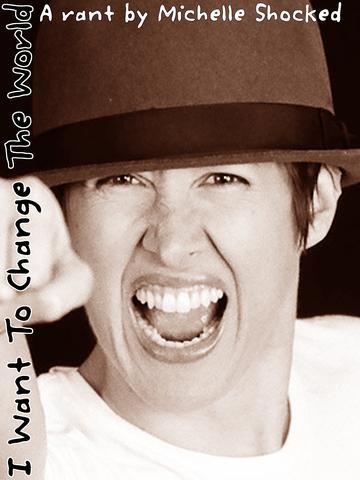At first the Formoz Festival looked like it was going to be the slightly poor Japanese cousin of next week's Ho-Hai-Yan Rock Festival with the lineup's heavy tilt toward Japanese bands that you wouldn't know unless you were somehow really into Japanese rock. But that was before the organizers -- Taiwan Rock Alliance (TRA) -- finalized their roster and made a surprise confirmation that American folk-rock legend Michelle Shocked will be playing the festival's first night on Friday, July 30.
"Michelle Shocked actually approached us to be part of the Say Yes to Taiwan concerts, but it didn't work out. But we managed to secure the budget and work out the schedules for Formoz," said Freddy Lin (
There have also been additional last-minute confirmations that have filled up the roster considerably, with more local and foreign bands and even DJ Aki, the Japanese drum `n' bass master who will join local electronica artists like DJ Noodle, Lim Kiung

PHOTO COURTESY OF TRA
TRA further announced this week that Mr Funky, one of Korea's most popular pop rock acts, will be playing the festival as well. In total, 20 foreign bands are scheduled to play the festival, most of them from Japan, Korea and Hong Kong.
The addition of Michelle Shocked, though, brings some unprecedented star power to the annual festival that has been held in progressively larger forms for 10 years.
Michelle Shocked surprised even herself when she first appeared on the rock scene in the mid-1980s with her blend of gritty east Texas folk tunes and radical politics nurtured in squatter settlements in the US and western Europe.
She's been a credible voice of left-wing political rock for almost two decades now and thanks to her having bargained to keep the rights to her releases on Mercury Records, a lot of her music is being re-released. Her albums have jumped erratically in style with each release, so it's hard to predict what she'll play in Taiwan, but she'll probably use the occasion for a little poltical commentary, which should be interesting.
Lin said three-day passes for the festival will cost about NT$1,000, which is less than most one-off shows for major international bands that pass through Taipei. The entire lineup of the festival, including the dozens of local bands that will play, can be seen at the festival's Web site: http://www.formoz.com.

On April 26, The Lancet published a letter from two doctors at Taichung-based China Medical University Hospital (CMUH) warning that “Taiwan’s Health Care System is on the Brink of Collapse.” The authors said that “Years of policy inaction and mismanagement of resources have led to the National Health Insurance system operating under unsustainable conditions.” The pushback was immediate. Errors in the paper were quickly identified and publicized, to discredit the authors (the hospital apologized). CNA reported that CMUH said the letter described Taiwan in 2021 as having 62 nurses per 10,000 people, when the correct number was 78 nurses per 10,000

As we live longer, our risk of cognitive impairment is increasing. How can we delay the onset of symptoms? Do we have to give up every indulgence or can small changes make a difference? We asked neurologists for tips on how to keep our brains healthy for life. TAKE CARE OF YOUR HEALTH “All of the sensible things that apply to bodily health apply to brain health,” says Suzanne O’Sullivan, a consultant in neurology at the National Hospital for Neurology and Neurosurgery in London, and the author of The Age of Diagnosis. “When you’re 20, you can get away with absolute

May 5 to May 11 What started out as friction between Taiwanese students at Taichung First High School and a Japanese head cook escalated dramatically over the first two weeks of May 1927. It began on April 30 when the cook’s wife knew that lotus starch used in that night’s dinner had rat feces in it, but failed to inform staff until the meal was already prepared. The students believed that her silence was intentional, and filed a complaint. The school’s Japanese administrators sided with the cook’s family, dismissing the students as troublemakers and clamping down on their freedoms — with

As Donald Trump’s executive order in March led to the shuttering of Voice of America (VOA) — the global broadcaster whose roots date back to the fight against Nazi propaganda — he quickly attracted support from figures not used to aligning themselves with any US administration. Trump had ordered the US Agency for Global Media, the federal agency that funds VOA and other groups promoting independent journalism overseas, to be “eliminated to the maximum extent consistent with applicable law.” The decision suddenly halted programming in 49 languages to more than 425 million people. In Moscow, Margarita Simonyan, the hardline editor-in-chief of the